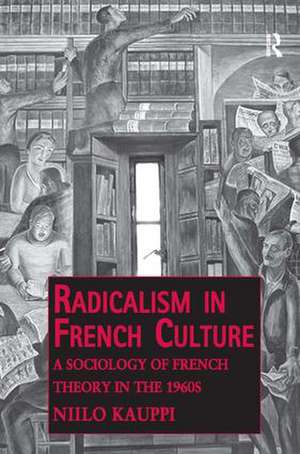Radicalism in French Culture: A Sociology of French Theory in the 1960s
Autor Niilo Kauppien Limba Engleză Hardback – 11 noi 2010
| Toate formatele și edițiile | Preț | Express |
|---|---|---|
| Paperback (1) | 469.34 lei 6-8 săpt. | |
| Taylor & Francis – 17 oct 2016 | 469.34 lei 6-8 săpt. | |
| Hardback (1) | 1054.71 lei 6-8 săpt. | |
| Taylor & Francis – 11 noi 2010 | 1054.71 lei 6-8 săpt. |
Preț: 1054.71 lei
Preț vechi: 1286.24 lei
-18% Nou
Puncte Express: 1582
Preț estimativ în valută:
201.85€ • 209.95$ • 166.63£
201.85€ • 209.95$ • 166.63£
Carte tipărită la comandă
Livrare economică 12-26 aprilie
Preluare comenzi: 021 569.72.76
Specificații
ISBN-13: 9781409407836
ISBN-10: 1409407837
Pagini: 164
Dimensiuni: 156 x 234 x 11 mm
Greutate: 0.45 kg
Ediția:1
Editura: Taylor & Francis
Colecția Routledge
Locul publicării:Oxford, United Kingdom
ISBN-10: 1409407837
Pagini: 164
Dimensiuni: 156 x 234 x 11 mm
Greutate: 0.45 kg
Ediția:1
Editura: Taylor & Francis
Colecția Routledge
Locul publicării:Oxford, United Kingdom
Notă biografică
Niilo Kauppi, Director of Research, CNRS/University of Strasbourg, France
Recenzii
'A welcome addition to the ever growing attempts to interpret the vast and enduring importance of French Theory - and one that, for the first time, puts Julia Kristeva in the central place from which others have excluded her. Recommended strongly for all who care about social theory and want to understand it.' Charles Lemert, Wesleyan University, USA '"French Theory" has exerted enormous international influence since the 60s and the ripple effects are felt throughout literary and critical studies, social theory, and Left politics. But many of those influenced have only fuzzy knowledge of its origins and its shaping context in the intellectual field of the 1960s. Radicalism in French Culture is a terrific guide providing a model for analyzing the relationship among political and intellectual movements and larger cultural fields.' Craig Calhoun, President, Social Science Research Council , USA '... the arguments that Kauppi presents here are interesting and provocative... Kauppi's project in Radicalism in French Culture is a significant one...' Radical Philosophy 'Niilo Kauppi, himself a former student of Bourdieu, has written a rich sociological study of the workings of knowledge production in Paris in the late 1960s, reconnecting familiar names and ideas both to each other, and to the fabric of the field that enabled their interaction... Kauppi's book represents a truly pioneering attempt to reconstruct theory in terms of its local political life.' Marx & Philosophy '... this book is a welcome addition to the ever increasing attempts to understands the immense and continuing importance of French theory, and one that, for the first time, puts Julia Kristeva in the central place. I would highly recommend this book for those who are keen to understand French social theory and especially for those interested in culture and society, in that arts in particular.' Irish Journal of Sociology 'Kauppi’s sociological treatment of structuralism proves illuminating on
Cuprins
Introduction; Part I From Literature to Revolution; Chapter 1 The Nouveau Roman and Rebellion; Chapter 2 The Tel Quel Saga; Chapter 3 Julia Kristeva’s Invasion of Paris; Chapter 4 Kristeva’s Power-Ideas: Ideologeme and the Zerologic Subject; Chapter 5 Rebellion around Tel Quel; Chapter 6 Sollerspierre, the Revolutionary of the Text; Chapter 7 “Sciences” of Meaning, Work and the Unconscious; Part II Désenchantement and Disintegration; Chapter 8 Neo-surrealism: Breton and Mao; Chapter 9 The Symbolic Revolution of Jacques Derrida; Chapter 10 The Taming of French Theory; Chapter 11 The Power-idea of Structure; Chapter 12 The Bourgeois Political Order: A Critique; Chapter 13 Constructing an Academic Sociology; epilogue Epilogue French Theory as Symbolic Transgression and Political Rebellion;
Descriere
This ground-breaking book furthers the internal sociological analysis of ideas and styles of thought by showing that the defining but largely neglected feature of what has become 'French theory' is a collective mind and style, with an explosive but fragile mixture of scientific and political radicalism. This will be a key text for social theorists and those interested in popular media culture within France.




